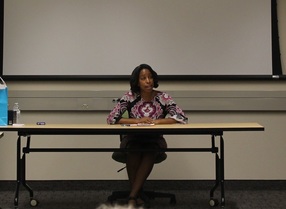 By Hanna Moore For first meeting of the semester, we heard from new PRKent faculty member Cheryl Ann Lambert, Ph.D., who spoke to us about how public relations is portrayed in the media. Lambert received a bachelor's degree in English, a master's degree in journalism and a doctorate degree in public relations. She served as an editor for five years at a Chilton Publishing Company trade magazine and worked in corporate public relations at Sears, Roebuck and Co. Lambert then went on to work as an assistant professor at Boston University before joining Kent State's faculty this fall. Dr. Lambert discussed the negative portrayals of public relations in society. She said, "If you believe that public relations is illegal, immoral and unethical, you're in the wrong major. People in PR don't think that." Dr. Lambert explained that the best way we, as students and soon-to-be public relations professionals can combat these stereotypes is by acting professional and leading by example. Dr. Lambert addressed some depictions of public relations in popular culture, saying that even though Scandal sometimes gives the public relations profession a bad reputation, she is still a huge fan of Olivia Pope and Judy Smith, the real-life woman who inspired the show. She said that even though some parts of the show accurately depict crisis communications, obviously Smith was not really covering up murders or having an affair with the President in real life. Dr. Lambert also discussed Samantha Jones, who played a publicist on Sex and the City. She said that Jones perpetuated the stereotypes that female public relations professionals only partied and used their bodies to get new clients. As for which public relations professionals in movies accurately depict public relations, Dr. Lambert referenced Kristen Wiig's character in The Martian and Jason Bateman's character in Hancock. Both of these characters actually showed what public relations professionals do in their careers and were shown in a positive light, Lambert said.
0 Comments
By Zabrina Hvostal PRSSA Kent members gathered Wednesday night to talk about ethical issues a professional may face during his or her career. Two professionals joined us and led the discussion: Kendra Davis and Tom Crilley. Kendra Davis is a two-time Kent State University graduate and holds a B.S. and M.A. in journalism and mass communication specializing in public relations. As a media relations professional, Kendra has strategically managed proactive and reactive publicity garnering local and national publicity for consumer, B2B and nonprofit brands. Her media relations work on the Eighth Annual Avon Heritage Duck Tape Festival received a 2011 PRSA Cleveland Rocks Award. In addition to more than five years of media relations expertise, Kendra has agency, social media and content management experience. Tom Crilley is the Director of Communications for software-development company Squirrels LLC in North Canton, Ohio. He manages the company’s PR and communications strategy, including media relations efforts, social media management and customer outreach. Tom began his career at the Akron, Ohio-based Smiley Hanchulak Marketing Communications, which was abruptly acquired just one month later by WhiteSpace Creative, an integrated marketing communications agency in Akron. He spent the next three years at WhiteSpace as the agency’s PR Coordinator where he developed client PR plans and wrote press releases, blog posts, eBlasts, social content and pretty much any other type of copy you can imagine. Tom graduated from the Kent State PR program in May 2012. Many students were curious about difficult issues professionals faced in their work place. Q: What is the most difficult ethical issue that you had to deal with in the work place? A: “Well recently my boss asked me to help him put his voice out there about a community issue that has been big in Cleveland with the Tamir Rice case going on: racism. I had to look at this from two points, personally and professionally. Being an African American woman I had to think of a way to serve my boss, but still stay on the right side of the issue, which is hard when there is no right side.” A: “ I was at Smiley Hanchulak for exactly one week before it was announced that our agency was being acquired by Whitespace Creative in downtown Akron. Our CEO was set to retire because he was ill. The original plan was the vice president was supposed to take over the agency when the CEO retired. But, at the last minute the CEO decided to sell to Whitespace and didn’t tell the vice president. So after dedicating his whole career to this agency, he was left with nothing and couldn’t even get into the building because the president changed the locks on the door. It affected all the employees, no one knew how safe their job was at that point.” The second half of the meeting students broke up into groups to discuss ethical scenarios. Students were able to identify issues, determine internal/external factors, and apply key values. The discussion was open ended and allowed students to consider different perspectives. Below are the links to the scenarios discussed at the meeting: http://www.prsa.org/AboutPRSA/Ethics/Resources/CaseStudies/EducatorCaseStudy7.pdf http://www.prsa.org/AboutPRSA/Ethics/Resources/CaseStudies/EthicsCaseStudy6.pdf 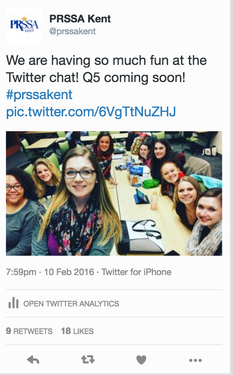 PRSSA Kent hosted its second annual Twitter Chat Wednesday, Feb. 10, about working toward a career in public relations. Students, alumni, faculty and other PRSSA chapters all joined in to share their experiences about finding their first job in PR and some helpful tips to young professionals entering the field. “Many students are unsure of where to start when looking for a PR job,” Chapter President Gabrielle Woodard said. “The reason behind choosing that topic was to give students a place to start and an opportunity to network online.” The Q&A session started at 7:30 p.m. led by the @prssakent Twitter handle. Anyone could join the conversation using the hashtag #PRSSAKent. The questions from the chat included the following:
Click Here for Storify of Twitter Chat. Twitter Chats are a great way to network with other PR professionals. For more information on upcoming National PRSSA Twitter Chats visit http://prssa.prsa.org/news/social_media/ . 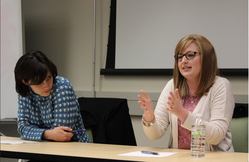 By Zabrina Hvostal The room was full Wednesday night, Jan. 27, 2016, for PRSSA Kent’s first meeting of the semester ‘Where Do You Belong.’ Three professionals from agency, corporate and nonprofit came in for a discussion panel to help students decide what sector of PR they would like to work in. Our representative from the corporate sector was Barb Barkley, Global Internal Communications Manager for The Goodyear Tire & Rubber Co. Barkley has been with Goodyear for three years, and is currently responsible for managing Goodyear’s global communication channels including the GO News intranet site, digital signage and the company’s internal social network, Yammer. She previously managed internal communications for Goodyear’s 620 nationwide company-owned retail stores. Barb holds a bachelor’s degree in Journalism and Mass Communication from the State University of New York College at Brockport and a Masters degree in Public Relations from Kent State University. Carli Cichocki, previous PRSSA Kent Officer and 2006 Kent State graduate in public relations, has an extensive background in non-profit public relations. Cichocki is a photographer and filmmaker based in Cleveland, Ohio. She works to tell thought provoking stories to connect and inspire people. She has worked for non-profits including the Cleveland Clinic and in Washington D.C. for Senator Sherrod Brown. She is currently pursuing her Master’s degree in Photography from Syracuse University. Allison Ewing has spent the last four years at an agency called True Digital Communications. From intern to associate and current digital communications specialist, she has learned all the ins and outs of all things in the digital world. Although she may not be a numbers gal, words come easily to her, which is why content creation, social media strategy and project management are in her wheelhouse. Some of the questions the panel were asked include the following: What makes your type of PR unique? Barb: “By working in corporate PR and only working with one client, you really get to see the process. Working for one company for many years gives you a better understanding of your audiences and how to communicate to them. You really become an expert on the company from the inside and out. Corporate PR isn’t as limited as some people think it would be. Even though you technically are hired by one client you are working with a bunch of internal client as well.” Allison: “When working in an agency everyday is different. You are juggling a bunch of different clients and their needs, what they need from you that day may vary. At True, all my coworkers have different specialties to help with clients’ needs. Our day is never the same, what I did today is completely different than what I’ll do tomorrow.” Carli: “My favorite part of non-profit work is being able to help a cause. I am able to help organizations I care about. Personally, I am interested in social issues and women’s issues. You learn about your audiences and what they value and how they communicate and that is what makes your work matter.” What are the most important skills someone in your profession must have? Barb: “Writing and helping people tell their stories is critical. You have to be a good communicator and understand what channel you are writing for. Understand that listening is more important than talking.” Allison: “If you are looking to work in agency, being able to juggle multiple clients is critical. You have to be open to learning and knowing everything about your clients. Having a positive attitude goes a long way.” Carli: “Like Barb said writing is everything. But, you also have to be kind, have a good work ethic and be articulate. Something we never talked about in school, but I have learned the past 10 years is you need to have emotional control. Life gets messy, but you have to leave whatever is going on in your personal life at home. Being an emotional person can be a good thing for storytelling, but you still have to be able to have enough control over your emotions to keep your attention where it needs to be.” What is the most challenging part of your job? Barb: “The most challenging thing is getting everyone to communicate on the same level. There is a big difference in communication in each generation. It’s a challenge getting people of board with new social tools.” Allison: “The most challenging part of the job for me is getting emotionally attached to my clients. I get very invested in them because I want them to do well.” At the end of the meeting students were able to go up and introduce themselves to the professionals and ask any additional questions.  PRSSA Kent’s meeting “When PR Takes Center Stage: Performing Arts Public Relations” consisted of a panel of three guest speakers Stephanie Keefer, Marketing & Public Relations Manager at Playhouse Square in Cleveland, Valerie Renner, Media & Special Programming Director for the Akron Civic Theatre and Greg Josken, digital marketing and social media manger for Disney Theatrical Group. The panelist answered several questions pertaining to the entertainment industry and what each of their jobs entails. The questions included the following: What is a typical day like for you? Greg Josken says his job involves all distribution of all social content for productions. His responsibilities include checking social media channels to make sure everything is good. Also, looking through other sites and seeing what the competition is doing and learning new technology and how it can help us create stories. Josken explains how he is the project manager for many of Disney Theatrical Group’s (DTG) shows. Stephanie Keefer says she does marketing and PR for all shows at Playhouse Square. “The fun days are getting outside the office and getting to meet the performers and show them around,” Keefer says. “However, other days I sit at my desk in the office and hammer out spread sheets. It’s always something different.” Valerie Renner says her days are surrounded by deadlines and talking to the media about shows. She also does work in social media and event planning. “Every day I have a different deadline to meet,” Renner says. “My day is never set in stone.” What is opening day of a show like? Keefer says opening day is when all hands on deck are needed. Jobs vary from setting up the cast parties, dealing with the caterer, and preparing for the reviewers and media. Additionally, Keefer takes care of performers and getting them what they need. Renner says she has an assistant and a runner that helps her set up on show days. She explains how she makes sure that the performers get what they want so they feel comfortable. “Most of them are on the road all the time,” Renner says. “We want them to feel relaxed and be able to mingle with others.” Josken says opening night for him is when all the planning from previous months comes together. “The hard part is keeping stories fresh and feeling new, like the Lion King that has been showing for 18 years,” Josken says. “Even though that’s an old story, it’s still the audiences first time seeing it and they want that new feeling.” What is the most challenging thing when dealing with stars? Renner says all stars have different demands. She recalls one of the strangest things she ever had to do for a star was ship his underwear to him over night from Akron to New York. “Usually I don’t ask questions, but this time I did,” Renner says. “Apparently his assistant forgot to pack his favorite pair and was trying to get it back to him before he noticed.” Keefer says her favorite thing about working with the stars is being able to take them out and show them around Cleveland. She says she loves to see them fall in love with the city while getting to know them and the places they traveled as well. What advice would you give to students who are interested in entering the entertainment industry? Keefer told students to be prepared for long hours and doing work even when you’re at home. “Don’t be afraid to step out of your comfort zone and try new things,” Keefer adds. “Ask questions and push yourself.” Renner tells students to find what they are passionate about. “Make sure you love what your doing and success with follow,” Renner says. “If you love your job it won’t feel like work. Make sure your passionate about what you choose to do.” Josken advises students to be open to opportunities. “Don’t be afraid to take a detour to another job as a stepping stone to get to your dream job,” Josken says. “Just keep building your resume and experience.” |
Archives
February 2018
|
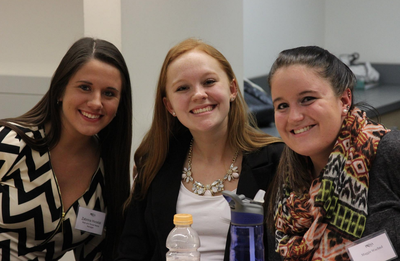
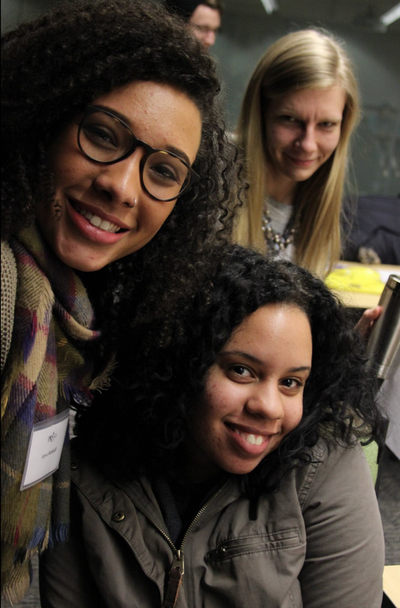
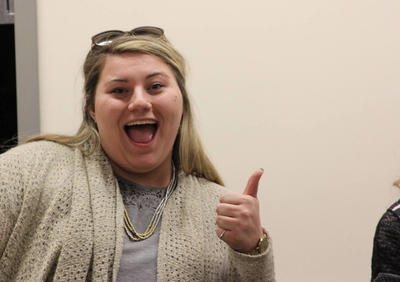
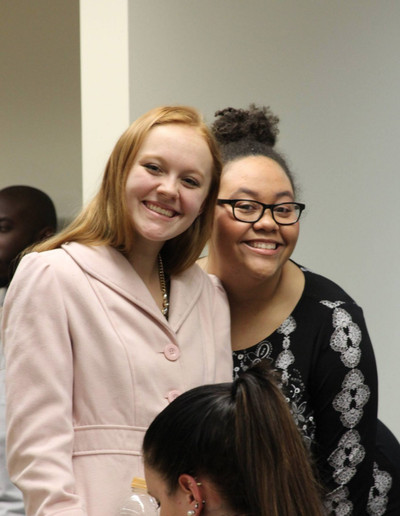
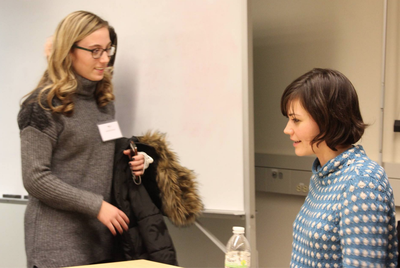
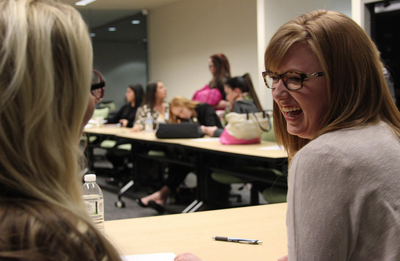
 RSS Feed
RSS Feed
